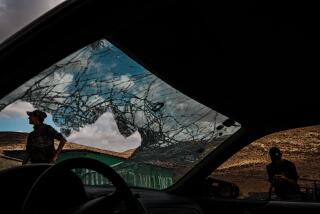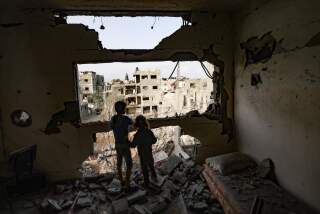Refugees Gather to Fight Pain of Abkhazian Battles : Russia: Former O.C. businessman joins fleeing countrymen in an Adygeyan town to aid the relief effort.
MAYKOP, Russia — Asma Marcheneye, 11, gabs with her friends outside her new home in the same Los Angeles Lakers sweat shirt she has been wearing for days.
Her playful appearance masks the nightmare that has become her life over the last year. She has not seen her father in more than six months. Nor does she even know if he is alive. She lives in a cramped hotel room in this village with her mother and brother. She has not gone to school in more than a year. She aches to return to her hometown of Sukhumi, Abkhazia, but cannot because it is under fire.
Her life, like those of the other 153 refugees living in the five-story Turbaza Maykop hotel, has been suspended in time since August, when Georgian leader Eduard A. Shevardnadze sent troops to Abkhazia to suppress the region’s secessionist movement.
Mike Abzakh, an American who lived in Orange County for 12 years, walks over to Asma and her friends and lovingly pats their heads. In the two years that Abzakh has lived in Maykop, he has become a champion for the welfare of Abkhazians.
“Of course life is easier in California,” said Abzakh, 37. “But I have a feeling these people need help and I want to do all my best to help them.”
As war rages on in Abkhazia, an estimated one-quarter of the Abkhazian population--25,000 women, children and the elderly--have escaped to safer havens. A large portion of Abkhazian refugees stream into Abzakh’s village of Maykop, though it is a six-hour mountainous drive from the border.
Maykop has 130,000 residents and is the capital of the autonomous republic of Adygeya, named for a tribal cousin of the Abkhazian people.
“We were originally the same people,” said Abzakh, an Adygeyan who was born in Amman, Jordan. “But the names and language changed. In ancient times if the Adygeya had problems, the Abkhazians helped us and vice-versa.”
This age-old tradition continues. Word is out in Abkhazia that Maykop’s government is helping refugees get back on their feet by allotting 12 million rubles each month to feed, clothe and house those fleeing the war.
“When I left, I had no shoes and no clothes,” said Rima Chitashova, 32, a former English teacher in the Abkhazian capital of Sukhumi, now a Georgian stronghold. “I only had my two children.”
Inside the refugee center, the women and children have forged bonds like those of an extended family. Three woman gather protectively around Sutsa Beya, 30, whose husband was killed in March.
She is dressed in black, deeply depressed, and can barely muster the strength to hold her 1-year-old son in her arms. Beya has built a small shrine for her husband: a picture of the couple, with her face covered by a napkin, is placed amid a bouquet of tulips standing in a beer can.
“We all cry together,” said Naira Lagvilava, Beya’s friend and fellow refugee. “All is so hard, but it is our life.”
Abzakh is modest about the amount of help he has single-handedly corralled for the Abkhazian people--both in Maykop and in their homeland.
But over time, bits and pieces slip out. His fund-raising drives span the globe and have yielded hundreds of thousands of dollars.
By calling back to friends in Orange County, and through personal appeals by his wife and brother, who have returned to the United States, Abzakh collected $25,000--enough to buy a satellite telephone for Abkhazians cut off from the rest of the world by the fighting.
He spurred a massive aid effort from Jordan, which resulted in the delivery of 16 tons of dry milk, clothes and medicines to Abkhazia. He has also drawn on resources from the large and wealthy Adygeyan community in Paterson, N.J.
Abzakh’s blue eyes, white cardigan sweater, blue jeans and white sneakers set him apart from most of Maykop’s population. But his Adygeya heritage bonds him with others.
“They call us mountain people,” Abzakh explained. “You feel like this is part of you, like you have been here before. It is very strange. People made me feel welcome.”
Abzakh feels compelled to give. He routinely visits the refugee center to check in on people, and never leaves without donating some money.
Abzakh’s original intent in relocating his family to Maykop was to become wealthy--by brokering oil and gas deals among American companies, the Maykop and Abkhazian governments. This goal seems to have taken a back seat to aiding the Abkhazian cause.
“Money comes and goes,” he said. “I love these people. The way they lived before and the way they live now. And the way they fight for freedom. There has never been peace. Someone always wants to come and take part of the land.”
Most recently it was the Georgians, who were given Abkhazia by the Soviets in 1936, when the fertile and mountainous North Caucasian territory was carved up.
Abzakh’s brother, Mahwan, 40, also uprooted himself from Stanton, where he co-owned the family business, to try to assimilate. Though his home is in Moscow, he spends months at a time in Maykop.
“I read a lot of history about the North Caucasian people,” Mahwan said. “By reading the books, I fell in love with the land and the people.”
Abzakh’s recently purchased two-story house is being remodeled and is a mess. A newly designed Adygeyan flag with green background and yellow stars graces the home’s only Western touch: a television set blaring the American soap opera “Santa Barbara,” dubbed in Russian.
Bare cement walls and loose electrical wiring do not stop men from surrounding Abzakh’s kitchen table and talking through the night about how to help Abkhazia.
The faces change from night to night. The discussion does not. On this particular night, Valery Arshba, who is the Abkhazian ambassador to Maykop; Mahwan Abzakh, and another Adygeyan friend, Zorab Kuzhbah, 43, talk about the next planned trip into Abkhazia.
Mike Abzakh has involved his family in the cause. His oldest son, Anzore, 12, has taken an interest and accompanied Mike on one of his trips to meet with the Abkhazian leader, Vladislav Ardzinba.
His wife, Carol, and younger son, Nart, 10, have had a more difficult time adjusting to Maykop. Neither speaks fluent Russian, heightening the sense of alienation.
“My wife doesn’t always accept life here,” he said. “She is not depressed, but sometimes it is so boring that a day goes by like a year.”
Last summer, she and Nart returned to California for the summer, leaving Anzore with his father.
The refugees, however, cannot return to their homes.
“All these women here dream about going back,” said Chitashova, pointing to the cluster of people sitting in the communal living area. “Every day we speak about it. My son talks to me every night about his house, friends and father. He is only 4 years old, but he is like an adult.”
Chitashova pulls out a videotape of a newscast from the first day of the Georgian invasion in Sukhumi. Twenty people cram into the room to watch the footage. Everyone is in tears, but they stay riveted to the television set. It is a touch of home.
“If we don’t help them, these people would be in the woods,” Abzakh said after the viewing the tape. “But this gets to me, too much. It breaks my heart.”
Though it’s difficult visiting the center, Abzakh has no intention of abandoning Maykop or its refugees in the near future. In fact, he has developed a fatherly attitude toward his new surroundings.
“Look at how green the fields are,” he said pointing to a meadow with yellow flowers right outside the refugee camp. “This is my tribe land.”
More to Read
Sign up for Essential California
The most important California stories and recommendations in your inbox every morning.
You may occasionally receive promotional content from the Los Angeles Times.










